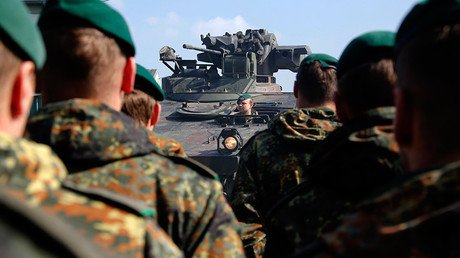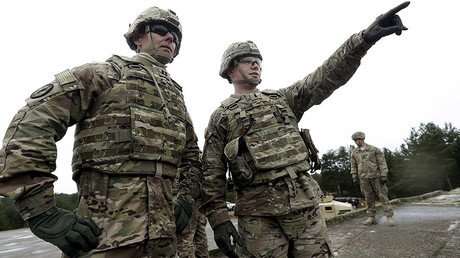EU Army approved, potentially saddling UK with £420mn annual bill
The EU Parliament has passed a resolution to create a defense union in the wake of numerous threats to the continent. The proposals slap the UK with an annual bill worth hundreds of millions of pounds, despite Britain’s vote to leave the bloc.
“Terrorism, hybrid threats and cyber and energy insecurity leave EU countries no choice but to step up their security and defense cooperation efforts, thus paving the way to the European Defence Union,” the EU parliament said after passing the non-binding resolution on Tuesday.
Lawmakers at the European Parliament voted 369-255 in favor of the resolution, proposals for which will be addressed at a European Council meeting in December.
The resolution envisions dedicating two percent of member nations’ GDP to defence as well as establishing EU multinational forces, to allow the bloc to act in any situation in which NATO could be unwilling to.
MEPs called on member states to pursue joint purchases of “defence resources,” and to share non-lethal material such as transport vehicles or aircraft.
The resolution asked the European Council to lead the creation of “common Union defence policy and to provide additional financial resources ensuring its implementation.”
The legislatures also backed investment in defence-related research projects “of at least €90 million ($96mn) during next three years”, which could be followed up by a separate European Defence Research Programme with an annual budget of €500 million ($530mn).
Under the approved resolution, Britain could be forced to help fund the project because Article 50 – the clause which must be invoked to trigger an exit from the union – will not have been enacted by the time the project is ratified.
Many in Europe believe such a force is required to bolster the union after the British exit.
“At a time when public support for the EU is being called into question in some member states, defense and security is an area where the individual and collective benefits of more Europe can be easily demonstrated, especially regarding the likely challenges to EU’s standing as a strategic actor following Brexit,” the EU has said.
The initiative would also see the creation of a European defense minister, who would oversee the army’s foundation, and an almost immediate injection of £76 million (US$95 million) for “preparatory action on EU defense research.”
If the UK proves incapable of untangling itself from the plan it could be required to shell out up to £420 million per year.
MEPs who are both for and against the idea spoke out on Monday ahead of the main debate.
Liberal MEP Urmas Paet was reported in the Express newspaper as saying “the state of European security has grown increasingly fragile. The EU, in order to defend itself and increase security, must do more.”
UKIP MEP, Brexiteer and former soldier Mike Hookem, meanwhile, said the army could drag the UK into a war against its will.
“It could threaten Britain’s military readiness if it were to be dragged along in an EU military by a political establishment trying it’s hardest to ignore the result of the EU referendum and leave the EU,” he warned.
He appeared to argue that EU laws which govern some EU militaries would have a diminishing effect on UK forces.
“There are clear security reasons why members of the armed forces are subject to different rules from those in civilian life: rules which were compensated for previously by governments who took the welfare of its troops and this country seriously with work and fiscal benefits,” he said.
“It is not in the country’s national interests for soldiers, sailors or airmen to be able to lay down arms and ignore the chain of command because of a union decision.
“I have been on exercises with Danish troops who stopped working at 1700hrs. Military life does not work like that and war does not fit into a 9-5 schedule,” he warned.
Political writer and journalist Dan Glazebrook believes that the resolution is “not really a surprise.”
“Since the economic crisis, a crisis ... [in] the US, and [the] Germany crisis since 1970 on[wards], it has always been a matter of time actually,” Glazebrook told RT.
“The whole world is deep in global capitalist crisis. The US is unable, and under Donald Trump is unwilling to finance the military umbrella over Europe,” he said, adding that this was only one reason that led to the plan.
“On the other hand, the EU is realizing that subordinating itself to the US is increasingly a game of diminishing returns,” the expert noted. He cited the example of Ukraine, believing that France, Germany and other European countries “had no interest in starting a trade war with Russia … but the US maneuvered them into doing it.”
“If they [the EU] want to act independently, if they want to stop being used … then they are going to have to strike on their own,” Glazebrook concluded.















